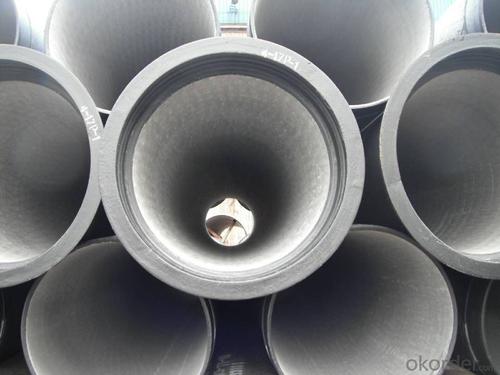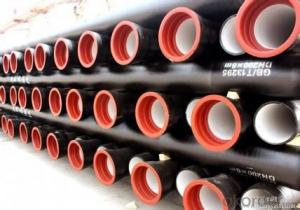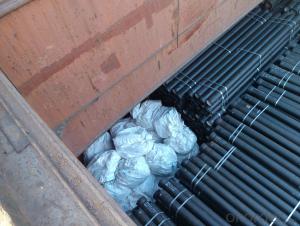DUCTILE IRON PIPE DN200 K8/C
- Loading Port:
- China Main Port
- Payment Terms:
- TT OR LC
- Min Order Qty:
- -
- Supply Capability:
- -
OKorder Service Pledge
OKorder Financial Service
You Might Also Like
Specification:
1) The standard of pipe: ISO2531:1998, K9
2) Effective length: 6m
3) Inner cement line: Portland cement line as per ISO4179
4) Zinc coating: at least 130g/m2 as per ISO8179
5) Bitumen painting: at least 70um as per ISO8179
6) With 100% quantity of NBR ring, or SBR ring, or EPDM ring as per ISO4633
7) DN80mm-800mm
8) High strength, lighter than grey iron, good corrosion resistance, no furring, small flow resistance, easy fixing, long life tome about 100 yeas
9) Produced by Hangzhou chunfeng machine
10) Checked by automatic inspection equipment
11) Composition:
Chemical composition | |||
Chemical composition | Ductile Cast Iron Pipe (%) | Grey iron pipe (%) | Steel pipe (%) |
C | 3.5-4.0 | 3.2-3.8 | 0.1-0.2 |
Si | 1.9-2.6 | 1.4-2.2 | 0.15-0.4 |
Mn | 0.15-0.45 | 0.4-0.6 | 0.3-0.6 |
P | ≤0.06 | ≤0.3 | 0.02-0.03 |
S | ≤0.02 | ≤0.1 | 0.02-0.03 |
Mg | 0.03-0.06 |
|
|
12) Feature:
Mechanical properties | |||
| Ductile Cast Iron Pipe | Grey Iron Pipe | Steel Pipe |
Tensile Strength(Mpa) | ≥420 | 150-260 | ≥400 |
Yield Strength(Mpa) | ≥300 | No Confirmation | No Confirmation |
Bending Strength(Mpa) | ≥590 | 200-360 | ≥400 |
Elongation (%) | ≥10 | Neglected | ≥18 |
Brinell Hardness(HBS) | ≤230 | ≤230 | About 140 |
13) T type mechanical joint
14) Packing: in bulk or container
- Q: Can ductile iron be welded? Is weldability comparable to gray iron?
- Suitable for the full range of cold welding welding, welding cast iron base material can almost all, and it is easy to achieve cast iron and carbon steel dissimilar metal welding, such as solving matrix fracture, crack, wear, hole filling defects after welding can be machined, many applications in the engine casing, cylinder head, casting machine, gear base the tooth of iron castings.
- Q: How are ductile iron pipes manufactured?
- Ductile iron pipes are produced using a technique called centrifugal casting, which employs a spinning mold. The process commences with the selection and preparation of top-notch ductile iron, a form of cast iron containing small quantities of magnesium to enhance its strength and ductility. Initially, the ductile iron is melted in a furnace at exceedingly high temperatures. Once the molten iron attains the desired temperature, it is poured into a rotating mold. Shaped like a pipe, the mold spins at a high speed, ensuring even distribution of the molten iron along its inner surface. While the mold spins, the molten iron cools and solidifies against the mold walls. This swift cooling leads to the formation of a fine-grained structure, thereby augmenting the mechanical properties of the pipe, including its strength and durability. The spinning mold continues to rotate until the pipe solidifies completely, typically within a few minutes. Upon solidification, the pipe is extracted from the mold and any excess material, referred to as the "skin," is eliminated. Typically, machining or grinding is employed to remove the skin, achieving the desired dimensions and surface finish. Subsequently, the pipe undergoes heat treatment to further enhance its mechanical properties and alleviate internal stresses. After the completion of heat treatment, the pipe undergoes a thorough inspection to identify any defects or imperfections. This inspection encompasses visual examinations, non-destructive testing methods, and pressure testing to ensure compliance with the required specifications and standards. If any defects are detected, the severity of the issue determines whether the pipe undergoes repair or is rejected. Lastly, the pipes are coated with a protective layer to prevent corrosion and extend their lifespan. This protective coating can be applied through various methods, such as cement mortar lining, epoxy coating, or zinc coating. In summary, the manufacturing process of ductile iron pipes encompasses iron melting, centrifugal casting, cooling, skin removal, heat treatment, inspection, and coating. This process guarantees the production of high-quality pipes characterized by exceptional strength, durability, and resistance to corrosion.
- Q: How do ductile iron pipes perform in high-altitude areas?
- Ductile iron pipes perform well in high-altitude areas due to their inherent strength and durability. The properties of ductile iron, including its high tensile strength and impact resistance, make it suitable for withstanding the challenges posed by high-altitude environments. One of the key advantages of ductile iron pipes is their ability to resist internal and external pressures. In high-altitude areas, where water pressure may vary significantly, ductile iron pipes can withstand the changes without compromising their structural integrity. This ensures the reliable and continuous flow of water without the risk of pipe failures or leaks. Ductile iron pipes also exhibit excellent resistance to corrosion, which is crucial in high-altitude areas where the atmospheric conditions can be more harsh and unpredictable. The pipes' protective lining and external coatings provide an additional layer of defense against corrosion, ensuring their longevity and reducing the need for frequent maintenance or replacements. Moreover, ductile iron pipes have a higher tolerance to temperature variations compared to other materials. In high-altitude areas, where temperature fluctuations can be extreme, these pipes can withstand the expansion and contraction without cracking or rupturing. This thermal stability is essential for maintaining the structural integrity of the pipeline system and preventing costly repairs. In summary, ductile iron pipes are well-suited for high-altitude areas due to their strength, durability, resistance to pressure variations, corrosion resistance, and thermal stability. These properties make them a reliable choice for water distribution systems in such environments, ensuring the continuous supply of water without compromising safety or efficiency.
- Q: What is the expected sound attenuation of ductile iron pipes?
- Several factors can affect the expected sound attenuation of ductile iron pipes. Generally, these pipes have good sound attenuation properties due to their dense construction and thick walls. The density of the material helps absorb and dampen sound waves, reducing noise transmission. Additionally, the thickness of the pipe walls adds an extra barrier for sound to pass through, contributing to sound attenuation. However, it's important to consider other factors that can influence the specific sound attenuation of ductile iron pipes. These factors include pipe diameter, wall thickness, installation method, and the surrounding environment. For example, larger diameter pipes may have slightly lower sound attenuation compared to smaller diameter pipes due to their increased surface area. Additionally, variations in wall thickness can affect the sound insulation properties. During installation, the presence of joints or fittings in the pipeline can create points where sound can transmit, reducing sound attenuation. Therefore, it is recommended to use proper installation techniques that minimize the use of joints and fittings to enhance sound attenuation. The surrounding environment also plays a role in sound attenuation. For instance, if the pipes are buried in soil, the composition and density of the soil can affect sound transmission properties. Moreover, the presence of other structures or materials nearby may influence the overall sound attenuation performance. To determine the specific expected sound attenuation of ductile iron pipes for a particular application, it is advisable to consult manufacturer specifications or seek assistance from acoustic engineering professionals. They can consider all relevant factors and conduct specific tests or simulations to provide accurate predictions.
- Q: What are the different types of joints used in ductile iron pipes?
- The different types of joints used in ductile iron pipes include push-on joints, restrained joints, mechanical joints, flanged joints, and welded joints.
- Q: Are ductile iron pipes suitable for underground installations?
- Yes, ductile iron pipes are suitable for underground installations. Ductile iron is known for its strength, durability, and resistance to corrosion, making it a reliable choice for underground applications where the pipes may be subjected to various environmental conditions. Additionally, ductile iron pipes have the flexibility to withstand ground movement and can be easily installed using various trenchless methods, making them a preferred option for underground installations.
- Q: What is the expected hoop stress capacity of ductile iron pipes?
- The expected hoop stress capacity of ductile iron pipes varies depending on the size and class of the pipe. However, ductile iron pipes typically have a high expected hoop stress capacity due to their robust and flexible nature, making them suitable for handling high-pressure applications.
- Q: Is there any cast iron pipe used in the fire hose?
- I don't know, I only know that the fire pipes produced by our company is the base tube is a pipe, and then coated with a corrosion and non-toxic, long service life, we are Suzhou Yuyao Pipe Industry Co. Ltd. is a professional production of the manufacturers, oh
- Q: How much is the installation fee of the 400 largest ductile iron pipe?
- Ductile iron pipes mainly called centrifugal ductile iron pipe, it has the properties of nature, iron and steel, excellent corrosion resistance, good ductility, good sealing effect, simple installation, mainly for municipal, industrial and mining enterprises, water supply, gas, oil etc.. Water supply pipe is the first choice, with high cost performance.
- Q: Can ductile iron pipe be used for water well applications?
- Indeed, water well applications can utilize ductile iron pipe. Renowned for its robustness and durability, ductile iron pipe proves appropriate for a multitude of uses, notably water well systems. Its remarkable resistance to corrosion is paramount in water well applications, as it endures constant exposure to water and potential impurities. Moreover, ductile iron pipe exhibits the capacity to withstand substantial pressure and external loads, rendering it a dependable selection for water well systems necessitating a sturdy and enduring piping material.
Send your message to us
DUCTILE IRON PIPE DN200 K8/C
- Loading Port:
- China Main Port
- Payment Terms:
- TT OR LC
- Min Order Qty:
- -
- Supply Capability:
- -
OKorder Service Pledge
OKorder Financial Service
Similar products
Hot products
Hot Searches
Related keywords


























